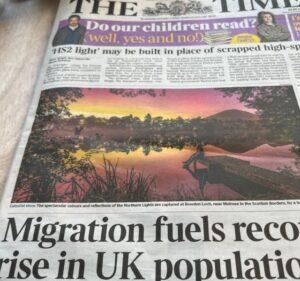- Sorry is the hardest word… - 4th February 2026
- Car trouble - 3rd February 2026
- ‘Ch-ch-changes’ copyright D. Bowie - 2nd February 2026
 Negative headlines about a recent huge surge in migration fuelling a record rise in population, fail to mention the enormous benefits foreigners bring – particularly to Wales.
Negative headlines about a recent huge surge in migration fuelling a record rise in population, fail to mention the enormous benefits foreigners bring – particularly to Wales.
The Times reported: “A surge in net migration drove the fastest population rise for at least 53 years, with 68.2 million people resident in the UK by the middle of last year”.

For example overseas students are (in theory) not permanent, although they are viewed by many as part of the migration ‘problem’, but they bring huge advantages.
Figures last year showed that the economic benefit of international students to universities in Wales is £1.43 billion, and on average each of the parliamentary constituencies in the country is £31 million better off because of overseas students – equivalent to approximately £390 per resident.

Even when accounting for dependents and other costs, international students are a huge net contributor to the UK economy, with every 11 non-EU students generating £1 mlllion worth of income.
As well as providing a much-needed boost for the country’s university sector across Wales international students are a major boost for Cardiff especially, which has a vast impact on the rest of the country.
 A report by the Migration Advisory Committee (MAC), an independent body, gave wholehearted backing to the view that the number of international students admitted on the Graduate Visa Scheme was vitally important.
A report by the Migration Advisory Committee (MAC), an independent body, gave wholehearted backing to the view that the number of international students admitted on the Graduate Visa Scheme was vitally important.
Members of MAC (to the surprise of ministers in London), said the risks of abuse were relatively low and were “not undermining” the integrity and quality of the higher education system.

 Unknowingly the review’s findings endorse the central role that Cardiff has in Wales, and how the increasing numbers of international students has emphasised its status; with the Cardiff Capital Region proving a crucial player in providing employment and wealth-creating opportunities.
Unknowingly the review’s findings endorse the central role that Cardiff has in Wales, and how the increasing numbers of international students has emphasised its status; with the Cardiff Capital Region proving a crucial player in providing employment and wealth-creating opportunities.

It has a Gross Value Added (GVA) (a measure of wealth), of more than £25 billion and accounts for at least 51 per cent of the income generated in the Welsh economy.
The desired outcomes in the region from its many programmes of intervention (£734 million of which is ring-fenced for Metro developments with the remaining £495 million available through a wider investment fund), are to deliver over 20 years 25,000 new jobs, generating an additional £4 billion of private sector investment, and increasing GVA by five per cent.

Fees and other wealth generated by international students for universities (among them Cardiff’s, which is the only one in Wales in the elite ‘Russell Group’) are also central, so the findings of the MAC inquiry, as well as news that population growth is fuelled by migration, may be welcomed by those who work in this sector.
Wales provides more courses per capita which are filled by international students than most other comparable parts of the UK and there is a long history of going on to higher education, so the reaction around the country could be especially supportive.

In 2022 the Russell Group said that institutions were making a loss of £1,750 a year teaching each home student because tuition fees have remained almost static for over 10 years and did not keep pace with inflation, so they had to turn to foreign students.
Universities say the graduate route is one of the main reasons foreign student numbers have shot upwards, with Home Office data suggesting that those admitted to universities in 2023 showed a 70 per cent increase on 2019, owing to growth in applicants from India, Nigeria and Pakistan.

Most of these new students are taking one-year masters’ courses in subjects such as business and management, and their arrival has helped keep universities in the black at a time when inflation has eaten into the income they receive from domestic students.
Tuition fees for Britons were capped at £9,000 annually in 2012, and on average, universities are losing £4,000 a year on every UK undergraduate, with experts believing some may end up pulling out of teaching UK students altogether, to focus entirely on international students.

If they stay in the UK (presumably becoming part of the official migration figures) research has revealed that the jobs these people then take are usually high-end, and not, as thought, delivering food on a bike – within a year they are largely earning salaries comparable to those of UK graduates.
Over two years they probably contribute more in tax, National Insurance (NI) and in a charge they pay to use the National Health Service (NHS), than it costs the UK Government to let them stay.

There could also be an unfortunate knock-on effect for the Private Rental Sector (PRS) (which is a particular driver of economic growth in Wales, Cardiff especially), if their numbers are restricted, as a lot of properties are let to international students.
One Cardiff landlord told The Eye: “Around a quarter of my flats are rented to international students, so they’re very important”.
This could be a message for the headline-writers who imply that inward migration is a BAD thing…

The memories of our Editor, Welshman Phil Parry’s astonishing decades-long award-winning career in journalism as he was gripped by the rare disabling condition Hereditary Spastic Paraplegia (HSP), have been released in a major book ‘A GOOD STORY’. Order it now
Tomorrow – why after 23 years with BBC Cymru Wales (BBC CW),and 41 years in journalism, for Phil information from internal sources has always been paramount, and now this is put centre stage by a new book which highlights how leaks from inside organisations have always embarrassed officials.








